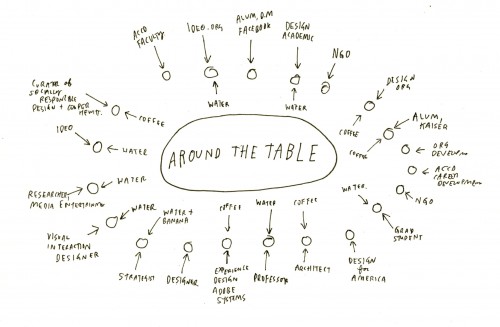
A new video by alum Erik Anderson — about the convening at Art Center of social innovation design students and educators, corporate and nonprofit leaders — has made Good’s 2013 Top 10 list. Illustration © 2013 Wendy MacNaughton for LEAP Symposium
“For all of you designers who need inspiration to conquer the wicked problems we face in the world today,” says Mariana Amatullo, “let’s remember that honesty, coupled with a good measure of bold determination and ingenuity, can help us leap forward.”
For Amatullo, Art Center vice president and co-founder of the social impact department Designmatters, honesty is an ethos that informs all of her work with her team at the College and with a growing cohort of young designers leading a global movement using “design thinking” to address seemingly intractable challenges—from homelessness and gun violence to water poverty and gender inequality—in ways that have never been tried before.
“We’re at a point where thousands of students across the country, in high school and college and graduate school, are joining [this] movement to participate in and impact the world around us,” says William Drenttel, an award-winning designer, publisher and design leader.
Along with Drenttel and like-minded colleagues at Art Center and around the country, Amatullo recently organized a national gathering of professionals and students to explore opportunities for strengthening the movement and shaping its future. A chief concern of the LEAP Symposium: How to make design for social innovation a viable career with navigable pathways, and how to prepare both students and potential employers for an era in which designers will be—must be—at the table in discussions large and small about solving the world’s “wicked problems.”
Here’s an idea. Try this out around your own Thanksgiving dinner table: When you’re sharing what you’re grateful for this year, be completely honest.
But, you might ask, in a time when “authenticity” and “realness” have been reduced to mere style, what does honesty even mean?
Amatullo, featured by Design Observer as part of the audio series Insights Per Minute, offers a definition of honesty inspired by the German philosopher Hans-Georg Gadamer: Our ability as human beings to be open to the new, to the different, and to the true.
The operative word is open. Openness, as a definition of honesty, goes beyond making statements—however raw or radical they may be—to invite an exchange, a back and forth, an ongoing conversation. This kind of honesty demands mutuality and humility, letting go of preconceived ideas and of the expectation of specific outcomes.
It’s this kind of honesty, says Amatullo, “that we strive for in every Designmatters project here at Art Center, a sense of honesty that is really important for designers who are looking to provoke social change. I was very inspired to witness that level of honesty in the conversation that participants brought to the LEAP Symposium and it’s a quality I look forward to seeing more of as the field continues to mature and grow.”
Learn more about the power of honesty in design. Take five minutes to watch the new video, LEAP Symposium: The New Professional Frontier in Design for Social Innovation, named by Good one of the Top 10 Public Interest Design Videos of 2013—featuring leading voices in the field including William Drenttel, Allan Chochinov, Lee Davis, Jocelyn Wyatt, Robert Fabricant and Art Center’s Karen Hofmann and Mariana Amatullo.








